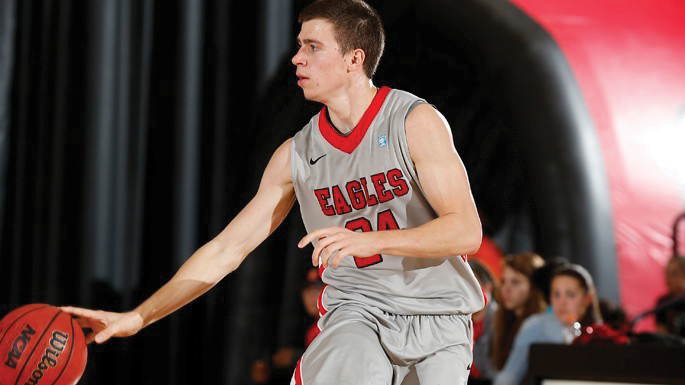Athlete Profile: Michael Woolf
Athlete Profile: Michael Woolf
March 31, 2014
Leading his team by scoring an average of 12.3 points per game and a team best of 50 3-pointers in a single season, Michael Woolf is described by his teammates as the Manu Ginóbili of Division III because of his playing style.
Woolf, a senior sports communication major at Benedictine University, was the captain and shooting guard of the 2014 Eagles basketball team. The team finished fifth in the Northern Athletics Collegiate Conference. He started in all of his games with the Eagles during his junior and senior year and won honorable mention for the all-conference selection. Growing up in Franklin Park, Ill., he says he has always been a fan of the Chicago Bulls, but he especially loves former Bulls shooting guard Ben Gordon.
The Chronicle spoke with Woolf about playing for Benedictine, being a team captain and planning his future.
THE CHRONICLE: When did you start playing basketball?
MICHAEL WOOLF: I played for my community center in a league there, probably in about third grade. Our elementary school had a team starting in fifth grade.
CC: Did your parents encourage you to play basketball?
MW: My parents were always happy that I enjoyed sports and they gave me every chance that I wanted to keep playing. They encouraged it. It wasn’t anything that was forced upon me. I always enjoyed it a lot and I always asked to continue to play.
CC: Why did you continue playing?
MW: Athletics have just always given me a different sense of accomplish- ment. I’ve always been a pretty good student, too, but the feeling of accomplishment that I get from ath- letics is different than [what] I get from anything else. It’s just really rewarding, all the work you put in and to see it pay off. It’s just different from anything in life.
CC: What is your most memorable experience playing for Benedictine?
MW: My sophomore year, I was kind of struggling. I wasn’t playing all too well the first half of that year. I knew that [my team] had expected more from me than what I was giving them, and we had a big game against Concordia University Wisconsin, [which] is supposed to have one of the best teams in our conference. We were losing by 1 with just a few seconds left. Our coach drew up a play for me to get the ball and I was able to drive the ball down the court. I made a layup with just a couple of seconds left to give us the lead, and we ended up hanging on for the win. From then on, I just kind of turned things around, and that’s probably the most memorable play I’ll have of my career here.
CC: What was it like leading your team?
MW: It was something a little bit different from what I had been used to. I wasn’t really used to being a vocal leader, and at the beginning of the year, I didn’t even know if I would be comfortable doing that, but as the season went on, I grew into that role. I just tried to do the best I could for our team.
CC: How have you balanced schoolwork with being team captain?
MW: It hasn’t been easy. It was something I would stress to the younger guys. I always tell these guys, “Unless you’re planning on going pro and playing basketball professionally, your grades are the most important thing because that’s what an employer is going to look at when you have to go in for an interview and try to get a job.” I always try to stay focused on that and understand that I’m going to be playing basketball for a few years, but I’m going to need a job for pretty much the rest of my life.
CC: What is your ideal job?
MW: I’d like to be a sports broadcaster either for a baseball or a basketball team as a play-by-play announcer.
CC: What significance does basketball have in your life?
MW: It’s always been a way for me to get my mind off of things, especially when I was younger. We always had a rim mounted up on top of the garage. If it was a rough day and I wanted to get out of the house and get my mind off things, basketball was always there.








